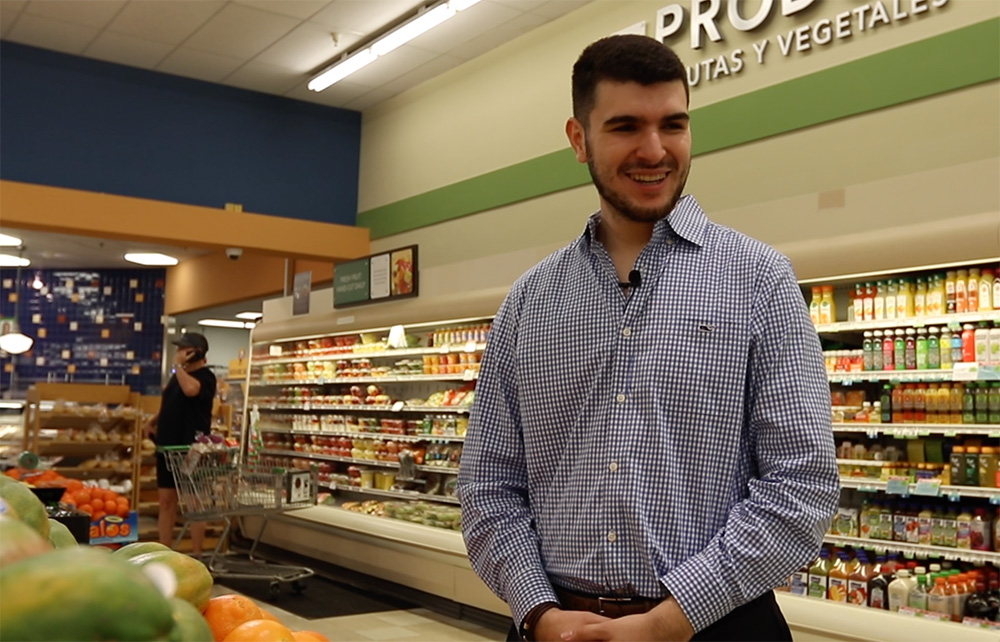Using a unique FIU Business-built blockchain, a multi-disciplinary team of FIU students captured first place in the Association for Information System’s national 2020 AIS Student Chapter Blockchain Challenge.
The national first-place victory, announced March 28, is a remarkable achievement for the four-person FIU team forced to work together remotely, and under tighter deadlines, by the COVID-19 social distancing environment. Using PantherChain, built by FIU Business leadership and faculty, they created a solution to an organic food supply chain challenge that was praised by competition judges for both its technical excellence and its usability.
“This team truly rose to the occasion,” said Hemang Subramanian, assistant professor in the Department of Information Systems and Business Analytics, who teaches and researches on blockchain and served as faculty advisor to the project. He noted that the competition included other prestigious schools with strong blockchain programs.

“Our students worked through night to put the pieces together. They are truly stars.”
The competition provided the first major opportunity to test PantherChain, a blockchain system developed by Subramanian and FIU Business Associate Dean Arijit Sengupta as an instructional vehicle for students studying the field and a research venture for faculty.
To meet the AIS challenge, Subramanian recruited students in his blockchain class and assembled a team in which each member brought a different expertise and skill set to the table.
Alex Vitaly, a business analytics and information technology major, brought business skills and a knowledge of the food delivery chain from family in the industry. Daniel Figueroa, an economics major with a minor in information technology, bought a business and costing perspective. Kian Maroofi, an electrical engineering major, had knowledge of software development and helped application programming interfaces for PantherChain. Sakshaam Bhatt, an international student in computer engineering, brought a background in blockchain, and designed and developed an Android app that communicated with PantherChain, making it simple and clear for farmers to use.

In addition to Subramanian, ISBA Clinical Professor Carlos Parra joined the effort as an advisor in project management and supply chain. They guided the team in the development of FarmTrace, a blockchain designed to give a full farmer-to-consumer supply chain view of goods, including shipping, pricing and certification details. These can be made available to anyone who interacts with the supply chain, including the farmer, shipper, aggregator, retailer and consumer.
Data from each step was carefully detailed so that those at each stage of the process had access to information about food traceability, certification and other details. In addition to the back end blockchain system, an app was designed to give the simplest possible access to anyone interacting with the supply chain.

After submitting a five-minute video on their project in early March, the FIU team was selected to present in person at the competition finals, scheduled for March 28-29. With COVID-19 imposing new social distancing requirements, the competition moved online—and the deadline was shortened by four full days.
Working around the clock, the team finalized their solution, pushed their data into live video demos and a presentation, and worked with members of FIU’s Marketing and Communications team to create a 20-minute video to meet the new entry deadlines. After submitting the presentation via YouTube, on the morning of March 26, the team had to present their solution via Zoom and answer challenging questions for 15 minutes from “some of the best brains in blockchain and the information systems community,” Subramanian said.
And then they waited.
After constantly checking his email through the night, it was shortly after midnight on March 28 that team member Alex Vitaly saw the notice that the team had emerged victorious. Within hours, he had shared the good news with his teammates, advisors, and by the next morning, the wider FIU Business community.

Competition judges “were impressed with how well your solution matched the problem as well as the real-life implementation potential of the solution,” according to a letter sent to competitors and advisors. “Your solution was clearly described, and its demonstration was clear and well-articulated. You should be proud of the great work you have done.”
Parra noted that in addition to hard work and high technical skills, the students engaged in a strong cross-cultural communication, without the option of in-person meetings, during a particularly stressful time—important accomplishments that will remain with them as they engage in challenging projects going forward.
In addition, Sengupta said, “PantherChain stands validated.” The FIU Business team will continue to work to expand its capabilities as a learning and research tool.



